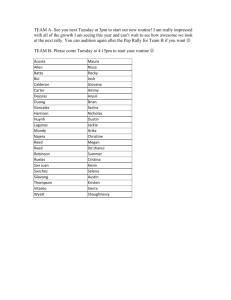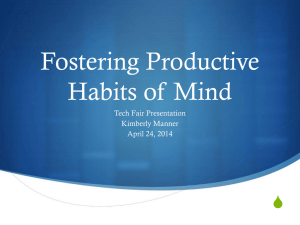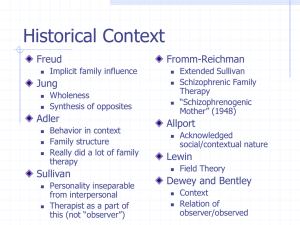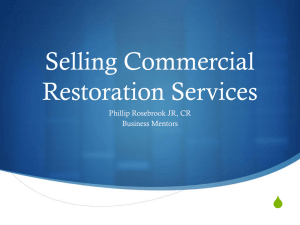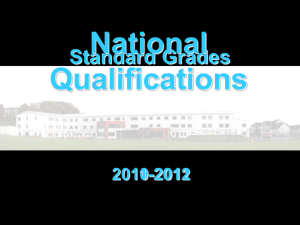Implementing Change - Phil Rosebrook Jr.
advertisement
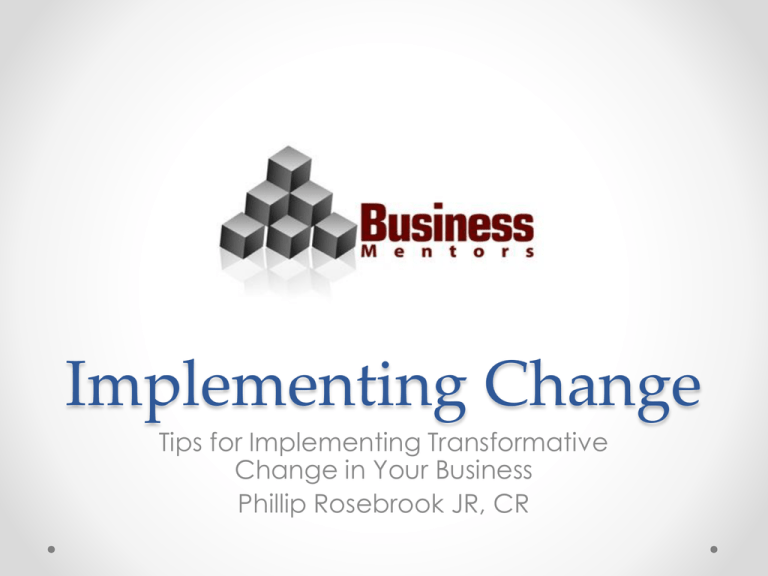
Implementing Change Tips for Implementing Transformative Change in Your Business Phillip Rosebrook JR, CR Perspective Premise • • • • • • • The world is changing The new normal – more with less The business world shifted Certainty is a delusion Competition is different Our clients are different CHANGE IS NEEDED! “The other day I got out my can-opener and was opening a can of worms when I thought, ‘What am I doing!’” - Jack Handey, Deepest Thoughts from “Saturday Night Live” Common Thoughts about Change • • • • • Difficult Uncomfortable Uncertain Confusion Frustrating • Unknown • Fear • Frustration Perspective • • • • • Necessary Livelihood Opportunity Success New paradigm • • • • Freedom Liberating New markets Upward mobility Inspiration • “You belong to a small, select group of confused people.” -Message in a fortune cookie • “If you define cowardice as running away at the first sign of danger, screaming and tripping and begging for mercy, then yes, Mister Brave Man, I guess I am a coward.” -Jack Handey, Deep Thoughts from “Saturday Night Live” Overview • • • • • Prioritization and strategy Understand the Change process First things first Creating a system Managing the process Change Process • Step forward into growth or back into safety o Abraham Maslow • • • • • Are you a victim or are you you driving it? Managing change is important Dream big start small Vague plans create vague results Just good enough is not Ask Yourself What is Truly Important? • Telling time or watchmaking • Focus on the customer • If you cannot measure it you can not manage it – if you measure it then manage it. • Chose wisely Long Term Thinking Behind the Scenes • • • • • • • Just wait it out – will return to “Our company changes like the tides” Changing underlying assumptions Lack of clarity Subversion – “I like things the way they are” Discipline Lack of conviction The Change Process Virginia Satir - Satir change model Critical Steps • • • • • Move strategic thinking to strategic doing Ability to quickly detect changes Ready, fire, aim with an adaptable plan Communication is essential Consider it done and culture of accountability The Leader’s Role • Pick other leaders • Set strategic direction • Conduct operations Rules for the Leader “It is a question of whether we’re going to go forward into the future or past to the back.” - Vice President Dan Quayle • Operate with highest integrity • Customer comes first • Got to understand and manage 3 processes o People o Strategy o Operations Clarity and Simplicity • Pick top 5 items to work on not top 20 • Understand that you are fighting nature • Clarify benefits to all – or simply the need – don’t change for the sake of change • Need to win the hearts and minds of your team? • Involve stakeholders in planning process Switch Process • • • • • • • Find “bright spots” Script the process Unwavering top down commitment Shrink the change Grow your people Build habits Rally your team Exercise • Think about challenges in your company • Follow through with this process • Create and enable leaders in your company Bright Spots • Human nature is to fix problems by studying problems • Recognize outliers and exceptions • What happens here? • How can we do more of this? • Report card – 1 A, 3 B’s and 1D Script Critical Moves • More choices create analysis paralysis • Ambiguity is the enemy • Complex problems don’t need complex solutions – simple gets done o Moments of Truth Point to the Destination • • • • • Black and white goals may be necessary Emphasize emotions Create destination postcards from the future Achieve long term goals through short term victories Clear, simple, achievable but out of reach, Find the Feeling • Link paycheck to purpose Shrink the Change • • • • Debt snowball Monthly components of annual goals Engineer early success Start acting in a way that fulfills goals o Meaningful o Within reach Grow Your People The Leader with no title Education Involvement Listen to your staff – Valuable members of your team. • High standards • Expect learning moments • • • • Tweak the Environment • Change company culture o Professionalism o Results o Exceptional performance • • • • • Respect closed doors Reduce hallway meetings Mornings are “golden” Put production on a pedestal Change email habits Build Habits Eat that frog Start and finish on time Daily and weekly routines Start the day positively with challenges for the day • Implement checklists and standardize procedures • • • • Rally the Herd • • • • • Strong orientation Victory meetings Mentorship programs Best practices reports Benchmarking Continuous Change • • • • • The need for change does not reside Positive reinforcement Routine strategic planning Industry networking Raise the bar Assessment • Review strategic plan o Any changes to fundamental assumptions • Review key activities o What is working well o What should we do more of o What can be learned from failure • Celebrate achievement “If you are losing a tug of war with a tiger, give him the rope before he gets to your arm. You can always buy more rope.” - Max Gunther Changing Culture • • • • What get’s celebrated Strong orientation program Reward, reinforce, penalize Language Accountability • • • • Who, What, How Mentoring program Board of directors High standards and expectations Have Fun! ”Looks like the upper hand is on the other foot.” - Leslie Nielson, in “Hotshots! Part Deaux” • Enjoy success • Work should be more fun than fun o Business ceases to be work when you are chasing a dream that engorges you • Lighten up and stop taking yourself too seriously • Be a good finder and cheerleader! “Somebody has to do something, and it’s just incredibly pathetic that it has to be us.” Jerry Garcia – Grateful Dead Thank you! Phillip@businessmentors.net www.businessmentors.net

